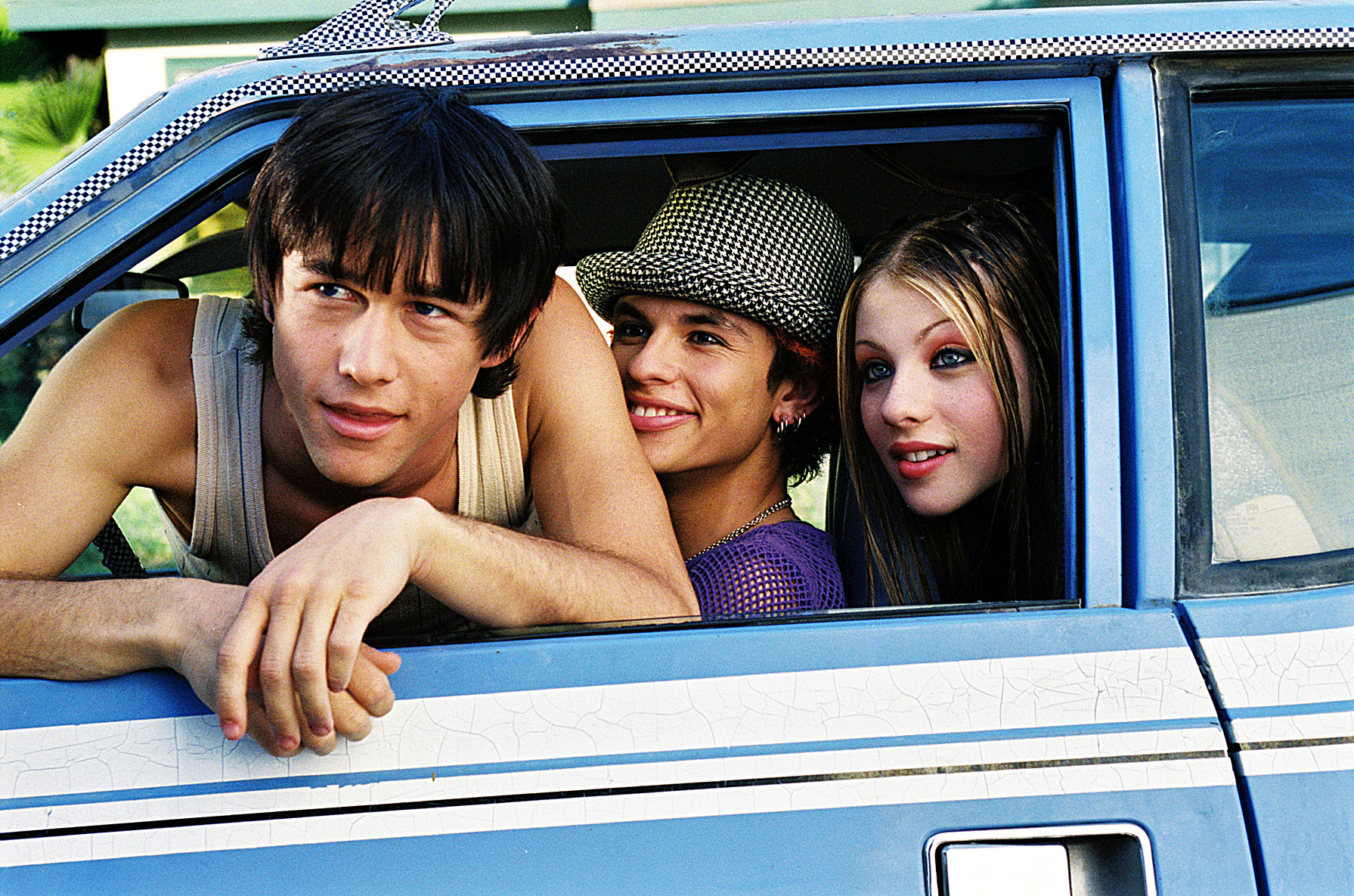It’s been 40 years since Pee-wee Herman lost his bike, and to be honest, we’re still not over it.
Released in August 1985, “Pee-wee’s Big Adventure” not only introduced audiences at large to Paul Reubens’ wild comic creation, it also welcomed us into the heightened world of Tim Burton. Then just an animator with a couple of credits under his belt, Burton was personally picked by Reubens to bring Pee-wee’s living-cartoon aesthetic to life on screen.
Turns out, it was a match made in heaven. Together, they sent viewers on a rip-roaring road trip following Reubens’ grey-suit-and-red-bowtie-loving manchild as he hitchhiked across America to find his beloved stolen bicycle. With Pee-wee’s unpredictability and Burton’s eye for detail, “Pee-wee’s Big Adventure” defied expectations and more than tripled its $7million budget. What’s more, it propelled the duo to household-name status.
Four decades on, a lot has changed. Reubens returned for a Burton-less sequel, 1988’s “Big Top Pee-wee,” that failed to hit the same heights as its predecessor. Thankfully, his beloved kids’ show “Pee-wee’s Playhouse” quickly followed before a double-punch of career-careening scandals hit. Reubens only just survived, eventually reviving Pee-wee more than 20 years later. First, in 2010, he returned to the Broadway show that first helped him gain traction, and later in 2017, he starred in Judd Apatow’s Netflix movie “Pee Wee’s Big Holiday.”
Meanwhile, Burton became one of Hollywood’s most in-demand directors. “Beetlejuice,” two Batman movies, and “Edward Scissorhands” helped cement his playfully sinister style. His “Big Adventure” composer Danny Elfman joined him on the ride to the top too, scoring most of his movies, leading all the way to last year’s mega-hit, “Beetlejuice Beetlejuice.”
Cut to 2025, and the world is a less playful place following Reubens’ sudden death in July 2023. However, the legacy of Pee-wee’s joyous first adventure feels more alive than ever. To celebrate its 40th, IndieWire reunited the movie’s key players, including Burton, Elfman, Simone star Diane Salinger, Dotty actress E.G. Daily, Mark Holton aka the bike-stealing Francis, and Large Marge effects creator Stephen Chiodo.
Together, they reflect on their time making a modern pop-culture classic, one with an afterlife that continues to grow like a cableknit sweater that someone keeps knitting, ah-ha-and knitting, ah-ha-and knitting, and ah-ha-and knitting…
The following interviews have been edited and condensed for clarity and length.
After a sell-out tour proves Pee-wee Herman can draw big crowds, Warner Bros. is ready to bring Reubens’ comic creation to the big screen. Phil Hartman, Michael Varhol, and Reubens write a script, and even though the studio has its own directors in mind, it’s the work of a newbie animator (recommended by Shelley Duvall) that catches Reubens’ eye…
Tim Burton (Director): It was my first movie and a major experience. I’d only done a couple of little short films, so to get the opportunity to do this — I found it at the time, and when I think back at it now, as quite an incredible thing to have happened.
E.G. Daily (played Dottie): At the time, I’d go from project to project. I didn’t have any expectations about anything. I’d just show up and be pleasantly surprised if it was good. I remember they saw a lot of really talented actresses and comedians [for Dottie]. I couldn’t really tell you what it was [in my audition that worked] for them, but I think what I brought was something a little scrappier, innocent, sweet, and tomboyish. I guess those elements worked.
Salinger: I knew I’d never be cast as a waitress. I was very bad at it when I was 15 growing up in Delaware and kept getting fired. I also knew that if I sounded like where I come from, they’d never cast me. That’s why I did a Southern accent. I had 20 minutes to prepare it before the first audition and practiced in the bathroom.
Burton: [Paul] was instrumental in picking me. Obviously, he was the most important aspect of it. I just felt really kind of strange and lucky. I had a harder time getting my restaurant job. To get to do a feature film? That was quite an amazing experience. I didn’t know [Pee-wee] that well, but I’d seen him on stage. I just loved the character, and it was an opportunity to do a movie where you try all sorts of different, weird little ideas. He was such a strong character.
Mark Holton (played Francis): I had seen Pee-wee on Letterman and thought, “This guy’s nuts.” That was my only encounter with the character until I went in to audition. Usually, you’d go in, see the casting director, and they call you back. I went in and there’s everybody — the producers, the director, the writers. They chatted with me for just a minute and said, ‘We’d like you to read with Paul’. I thought, ‘OK. No pressure…’
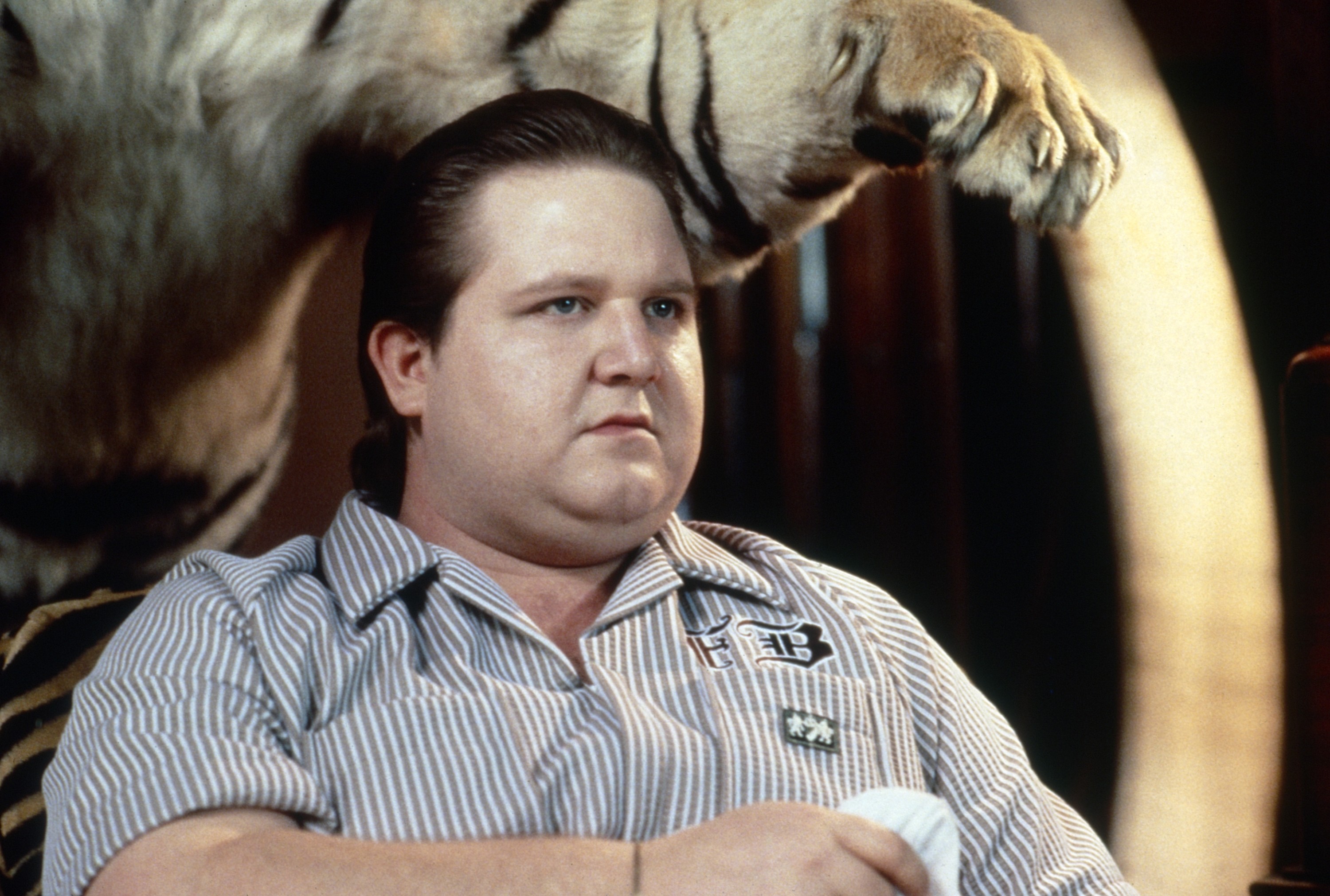
Diane Salinger (played Simone): I did my second audition on the same day as my first. For my callback, I thought I should do something more. Paul was reading with me, and Tim was also in the room with the casting director. Paul was sitting next to me, and in the middle of the scene, I started biting his finger. He was sort of shocked, and the others were laughing. They didn’t want me to do that in the movie. It was too sexual. Later on set, Phil Hartman told me Dottie had a crush on [Pee-wee], but I was the more mature version of a woman for Pee-wee.
Danny Elfman (Composer): I got the call randomly. I didn’t learn until later just how crucial Paul was in the decision [that got me hired]. I didn’t meet with him; I met with Tim. Five years prior, Paul had seen a midnight film my brother made called “Forbidden Zone.” Before I was in a rock band, I was in a musical theatrical troupe called The Mystic Knights of the Oingo Boingo, and they did the score. It’s a really quirky cult film. Paul saw it and made a little note. “If I ever make a movie, I gotta call this guy.” Well, amazingly, he didn’t lose that scrap of paper. When it came time for him and Tim to talk about music for “Pee-wee’s Big Adventure,” my name came up.
Holton: They had another actor [in mind for the role of Francis]. It was Louie Anderson. He was making a lot of money as a stand-up, and I think his agent pushed things a little too hard. Louie was a lot taller than me and bigger, even though I was quite rotund at the time. I think they just looked at what was on the written page and thought, “This guy’s a better choice — and he’s cheaper.”
Elfman: When I had my meeting with Tim, the first thing I thought was that maybe they wanted a song. I just assumed that’s what the meeting was about. When he informed me, “No, I’d like you to do the score,” I was like, “A score? Me?” I didn’t know how to do a score.
Daily: I felt that Dottie couldn’t be glamorous. I don’t think [Pee-wee] sees things like that. He’s a child. I had to pull in elements of childlike innocence. Dottie’s just sweet and simple. To me, that made more sense for somebody that he would find to be his girlfriend. I pulled out the childlike parts of myself.
Salinger: I almost turned it down. There was a scene in the script that never made it into the movie with Spec, Pee Wee’s dog. In it, the dog licked its butt, then licked Paul’s lips. It was a sweet scene, but I thought, “I did not do 10 years of Shakespeare to do a movie where a dog licks its butt, then the star’s mouth.” I was thinking of cancelling after I got the role, but thought, “No, you shouldn’t cancel. It’s your second movie. You’re just beginning.” I’m so grateful [I didn’t cancel it]. It never made it into the movie anyway.
Elfman: I was filled with excitement and dread. When I got the call that I’d gotten the job, I told my manager, “Tell him I can’t do it.” He goes, “Why?” “Because I don’t know how to score a film and I don’t want to f*ck up their film!” He says, “You call them and tell them you can’t do it. I’ve been working on this all week.” I literally looked at the phone all night. In a weird way, the thing that convinced me was having come from the punk era. Even though my band was not punk, it was of that ilk. I was in a weird rock band that seemed motivated by irritating people. That attitude ultimately saved me. It was like, “Well, fuck it. Just do it. It’s on them.”
Burton: In a strange way, I wasn’t really nervous. I mean, you have those normal nerves of something new and all of that, but I was sort of blessed with not being too worried about what people think. My background was animation. I just tried to go with what I felt was the spirit of [the script] and didn’t have any grand major [plan]. It was more just getting into the vibe of it. I liked doing it and went with that vibe, which kind of protected me. I felt supported by everybody, which is not always the case in films. It was very positive.
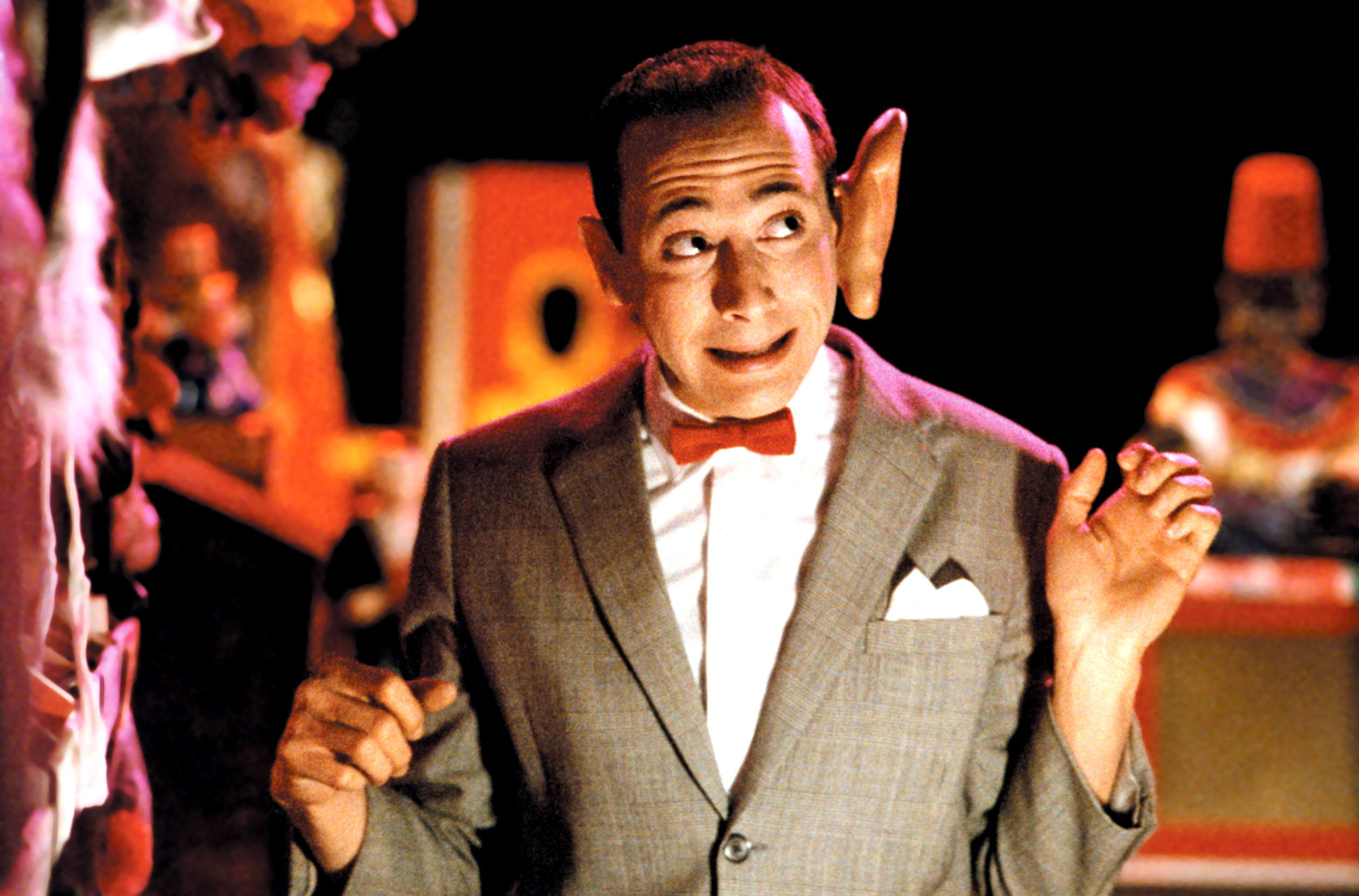
With Burton on board, Reubens’ script received a quick revision before shooting began in January 1985. Captured in just four months, Burton’s first film took its colorful cast and crew across California and deep in the heart of Texas, where Pee-wee would (supposedly) find his stolen bike, hidden in the basement of the Alamo…
Holton: Every day was different. I’d show up and they’d say, “OK, you’re dressed as the devil today” or “Today we’re hooking you up to a telescopic frame and flying you in front of a movie screen at night at an outdoor theater,” or “You’re on a tightrope in a bear costume,” a scene which didn’t make the movie but almost killed me.
Daily: [Tim] was very intense, very focused, and very clear about what he wanted. He was very specific and very prepared. I’m sure he and Paul had gone over everything because it was Paul’s baby, but I just felt like Tim was all the things he is today: brilliant, artistic, and not typical.
Elfman: The music that came out was all my first impulse. Now, I’m more likely to approach a scene two or three different ways. I’m not a pianist, but I remember trying to play the Breakfast Machine music for Tim. It was right on the cusp of having the ability to play stuff with computers. It was really hairy having no piano experience at all and trying to play this very simple piece of music.
Salinger: The first scene I shot was at the bus stop where Pee-wee is talking about the Alamo, and I run into him. In rehearsal, Paul said, “I’m going to let you kiss me with your side facing the camera so that you have this moment.” It was very generous. I came from the theater and didn’t know about camera stuff.
Burton: There were lots of meetings where Paul, Phil, Michael, and I were trying to throw ideas around a little bit, almost like animation meetings – but the script was always pretty much as it was. I remember we were always kind of working on it, but it was a little budget [movie]. We sort of shot what it was, and there wasn’t a lot of extra shooting.
Elfman: I remember seeing the bicycle race at the beginning of the movie. My sense of it was that it didn’t feel like a normal American comedy. It almost felt like a European comedy. It reminded me of something I might see in France or England, like “Mr. Bean” or “Mr. Hulot’s Holiday,” so I approached it as if it was a kind of weird Italian film.
Salinger: There was no improvisation, but in the drive-in scene at the end, where Pee-wee tries to imitate French with me and Pierre? That’s totally improvised. He was a brilliant improviser, but we mostly stuck to the script.
Daily: Tim was able to execute what Paul really wanted and add his own thing. I think that’s why it was so magical. As far as who was the director, that was clear, but Paul was very hands-on, as he should have been because he created the whole thing. Those are his characters, but Tim was respectful of all the things about Paul that were so established. It was already fleshed out.
Burton: [Paul] was the character, so there was never any conflict, like, “No, Pee-wee wouldn’t do that” or that kind of thing. Even before I did [the movie], I just felt connected to the character. I understood it and felt it. That was strongly there from the beginning.
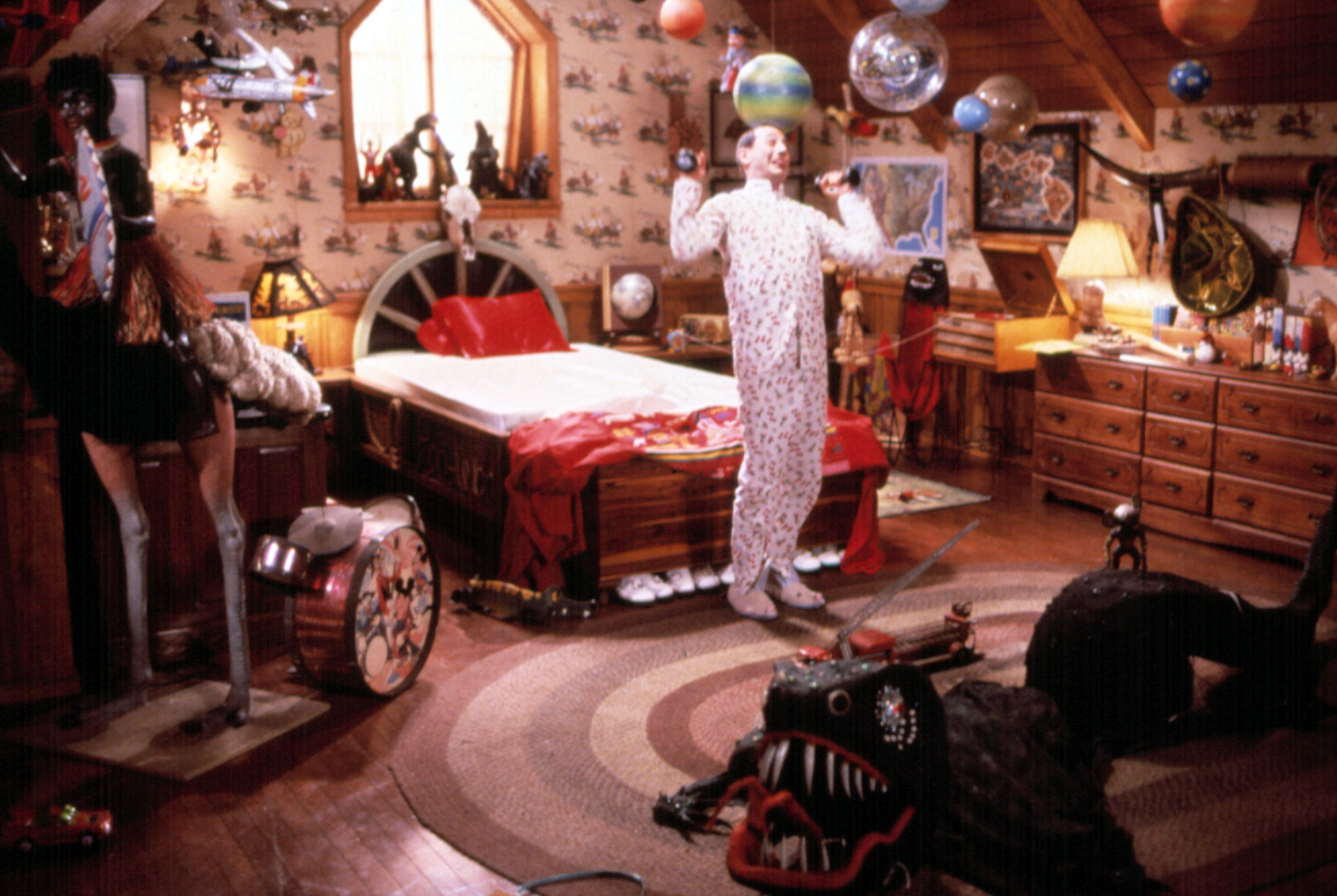
Holton: Pee-wee was Pee-wee. Paul was very meticulous about some things. Some were just engraved in stone. I don’t remember any big changes [from the script], but there was never any tension or any disagreement. [Tim and Paul] had gone through this thing scene by scene before the film ever started.
Salinger: Paul really knew this character. He’d done it at The Groundlings and taken it on tour. He came with it ready-made. Most of the time, [Tim] left me alone and didn’t say a thing. It’s the sign of a really good director.
Burton: I didn’t really speak very much early on in life. Communicating with people was very difficult for me, but it was kind of necessary, so [working on Pee-wee] actually did open up something in me. I was told I spoke in every third, fourth, or fifth word and raced ahead. Nobody could really understand what I was talking about. I tried to calm down a little bit. It was a really good thing for me to learn how to do because, as an animator, you usually sit in a dark room all day and talk to yourself.
Elfman: I learned a lot about the mechanics of how to score a film. I had a knack for finding tempos and timings. When Pee-wee’s riding in the park, he’s kind of humming, and I decided I’d try to put music to it and make it sound like he was hearing the score and singing along with it. Today, with time code locks, you can do that relatively easily, but at the time, it was tricky. I also discovered that if I found the internal timing of a scene, the music would just hit, like they’d cut to the music rather than me scoring the picture.
Burton: Danny and I talked about trying to get into that kind of scenario, without being overly cartoony. With cartoons, it’s almost like silent movie music, where the music tells the story of what you’re seeing. It’s a cartoon technique, but we didn’t try to overdo it. When it fit with that sort of structure, he’d do it, like little sing-songy things or Pee-wee knocking on Francis’s front door. We treated it like a silent movie.
As Pee-wee sets off to find his bike, he crosses paths with giant dinosaurs, Simone’s big butt, and the eye-popping trucker ghost Large Marge, all the while being plagued by visions of his nemesis: the bike-stealing Francis…
Stephen Chiodo (Large Marge effects artist): I’d worked with Tim and [Producer] Rick Heinrichs on Tim’s Vincent short. A couple of years later, Rick contacted me about the stop-motion effects in Pee-wee. He had two shots: the dinosaur with the bicycle and Large Marge. I said, “Oh, I love dinosaurs. I want to do the dinosaur shot.” He said, “You can do Large Marge.” I thought, “Oh shit.” We didn’t know how we were going to do it.
Burton: It was a nice low-budget movie, and [stop motion] fit very clearly. It was fun to use a little bit of those techniques, even though it’s a live-action film. For me, it gave it a little something [extra] that I love.
Chiodo: Tim wanted this “boo” cut. He gave me key drawings of what he wanted. The character [played by Alice Nunn] had to change from her normal view, then kind of squash down to an anticipation for the first look. Then, the eyes pop, the face thins, the eyes get wider, a few frames of the most extreme point, then it snaps back. Tim wanted to go beyond the extreme and then back again. As an animator, his sketches helped me tremendously. He was able to articulate verbally, but because he’s an illustrator, it was much more effective.
Salinger: It was my first day on the set, and I hadn’t done many movies. I was nervous. We were sitting in the hair and makeup trailer, and all of a sudden, it jolted back. Literally. Somebody stepped on, and the whole trailer went back and forth. This woman got on and said, “What the fuck, god damn it, son of a bitch… I couldn’t find this piece of shit place.” She sat down next to me in the makeup chair, and I said, “I take it you’re Large Marge?”
Burton: Sometimes you get these people and go, “Oh my God, it is Large Marge.” There she is for real. Some people don’t need to act. They just… be.
Chiodo: We decided to do a head casting of [Nunn]. The real trick was being able to match her as best we could. I had replacement eyes so we could switch from human eyes to larger ones incrementally. The clay cast didn’t look real underneath the lights. We had Alice’s wig and costume, but it still didn’t match. I brought in Bonita DeHaven, a makeup artist I knew. We found out what makeup was used on the live shoot and duplicated that. It gave us the same reflection and patina as the actress.
Burton: I love the kind of quick, haphazard nature of it. It just sort of fit into the spirit of Pee-wee and felt natural.
Chiodo: I think the reason why the scene works so well is that it’s just beautifully designed, from the build-up to the payoff. It builds so well to that really great boo. [How much it scarred you] depends on how old you were at the time, your state of mind, and who you were with. A scare with a laugh is the best kind of relief, and I think Tim has done that consistently with his work. He’s really walked that tightrope of being scary but still keeping it fun.
Burton: If you can emotionally scar one person, that’s OK with me. I love that. It makes me happy [laughs].
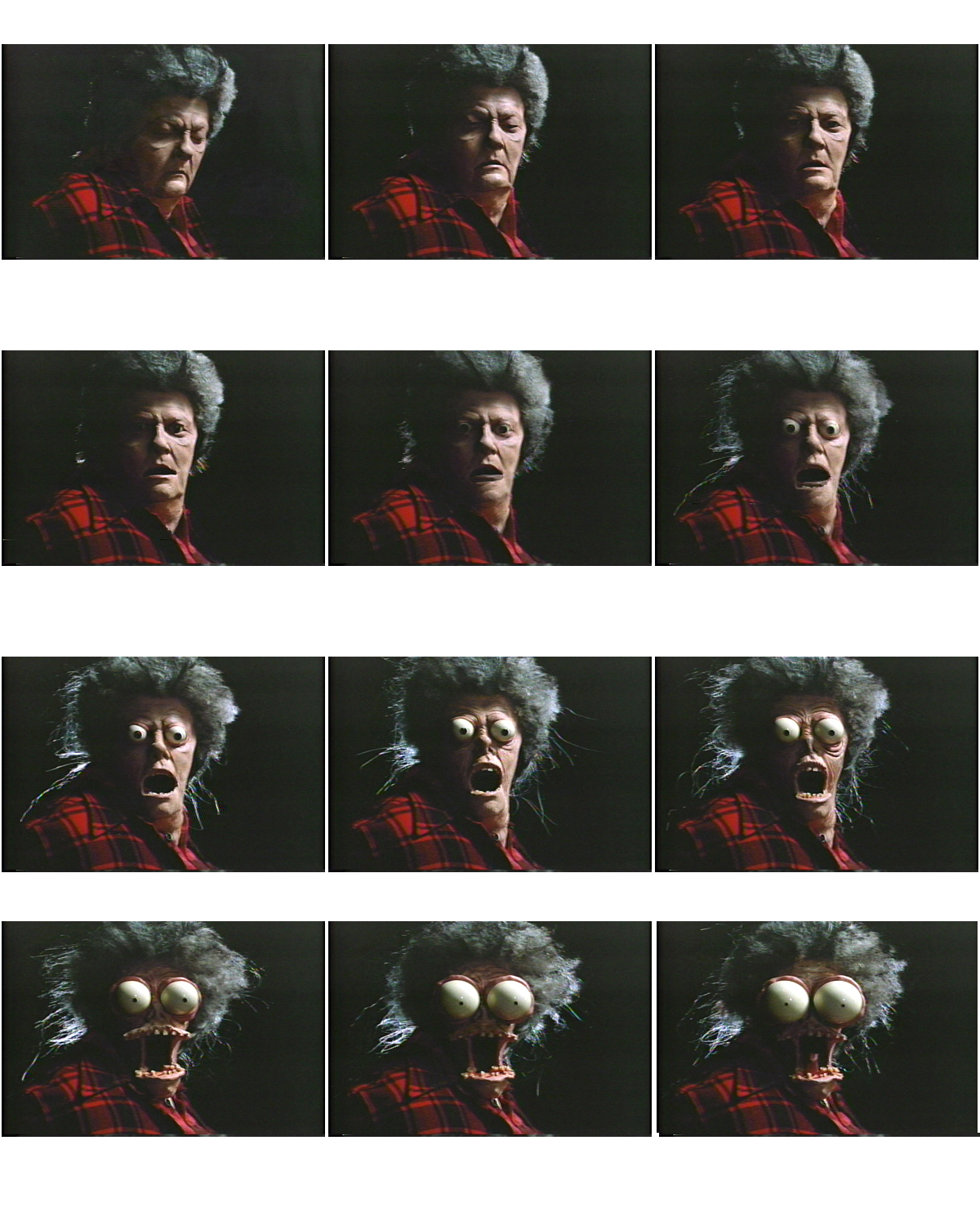
Salinger: When me and Paul were in the dinosaur mouth together, I remember Tim telling me to lower my voice when I said, “Do you have any dreams?” I didn’t even realize that it was sexual. That’s the biggest direction I think Tim gave me.
Burton: I met the guy [who made the Cabazon Dinosaurs], Claude Bell. He was like 89 years old and took me out to the desert past the two dinosaurs. He pointed to the horizon. He had this dream of building a giant woolly mammoth that was bigger than the other two. He described it all to me, and I felt very blessed to hear this amazing guy talk about his one final dinosaur.
Salinger: I love the dinosaur scene and the idea of following your dreams. I don’t usually get depressed, but for some reason, right before we shot the interior of it in the Warner Bros. sound stage, I was depressed. I leant into it, which was perfect for the scene. Paul and I sort of locked eyes and had this intense connection.
Holton: There was a dream sequence that nearly killed me but didn’t make it into the final film. Pee-wee’s on a tightrope in the circus, and there’s a bear on his bicycle riding towards him. It stops, pulls the head off the bear costume, and it’s Francis laughing. They’d rigged the bike on a track, and the handlebars gave out and went straight down instantly. The bear costume was from the 40s. It was a real, no-sh*t bear costum,e and it was heavy. I’m about 15 feet from a concrete floor and thought, “Oh my God, here comes the emergency room.” Out of nowhere, there were hands grabbing every point of the bicycle. They fixed the handlebars and said, “Let’s go for another take!” I’m going, “Holy shit.”
Daily: There were moments when we weren’t filming where Paul was gentle and quiet. He’d show me these toys. He had a crazy collection, and he loved vintage things. He lived that world.
Burton: I got to do a bit of a biker movie, a bit of a road movie, a convict movie, a bad James Bond movie… every sequence had something strange and new about it. It really was exciting because every day was something different. A different little genre and a different type of movie.
Salinger: I came to the set one day when I was not needed. It was the scene where the convertible falls off the cliff, and Mickey [Judd Omen] and Pee-wee are screaming, and they hug. They were doing take after take. I’m very intuitive. Some people say I’m psychic. I went up to Paul and Tim when they were taking a break and said, “This movie is going to be bigger than anyone has any idea about” — and I was right. I knew it was going to be enormous.
After a limited July release, “Pee-wee’s Big Adventure” opened across America on August 9, 1985. It was a surprise hit — recouping most of its $7 million budget before its opening weekend was over. When all was said and done, Burton’s film would go on to gross more than $40 million, helping Pee-wee Herman become a pop-culture icon.
Daily: I didn’t have any expectations. I just moved on to whatever the next thing was that I was doing, so when we had this huge premiere and I got to see the movie, that was super exciting.
Holton: That was a magical evening. It was the first live motion picture premiere in the history of MTV. They had Hollywood Boulevard blocked off, and all the stars dropped by. Paul was there dressed as Pee-wee doing his schtick with them as they would show up.
Burton: I don’t remember there being any studio notes. It was a low-budget movie, so there weren’t high expectations like you’d get nowadays. It was kind of under the radar.
Daily: I ended up singing [at the premiere] and me and Paul rode in on a bicycle carriage. The thing just kept opening up bigger and bigger. I didn’t know it was going to open up so wide.
Holton: I went to the party on the top floor of a parking garage somewhere on Hollywood Boulevard. They had mimes riding on a bicycle for two, which was quickly stolen by Mr. T. He crashed into a bunch of tables, came over, gave me a high-five, and said, “You are a bad brother.” I thought, “Did that just happen? Yes, it did…”
Burton: I sat next to Mr. T during the premiere. That was fun. Scary but fun. He seemed [to like the movie]. He didn’t lean across the aisle and choke me to death.
Holton: I was absolutely stunned at how good the movie was. I laughed my butt off watching it with an audience in a packed house that was laughing at all the right moments.
Burton: I’m just a weird person. I feel very vulnerable when a movie is playing. I almost leave my body. I can’t really tell what the reactions are. From that moment on, it doesn’t change much.
Elfman: As I wrote the score, I really did seriously feel that it would be thrown out when Warner Bros. heard it. I thought they’d want a real composer. I mainly wrote it for the experience.
Burton: It was my first movie, and it was [Danny’s] first movie where he had to go into Warner Bros. with a full orchestra, so it was kind of amazing to see him do his first orchestral thing. It felt like there was a connection on that level, a certain newness to the whole process.
Chiodo: I went to the premiere with Bonnie DeHaven because she was essential in making Large Marge. We were both happy with the audience’s reaction. Everyone was talking about it afterwards.
Holton: One part of filming that my mind goes back to was when Tim, Paul, and I were in a van after we’d had to switch locations. They started talking about their ideas for part two.
Burton: At one point, Paul and I discussed the idea of doing a version later on, like a “What Ever Happened to Baby Jane?” kind of thing. I think a lot of that was just joking around.
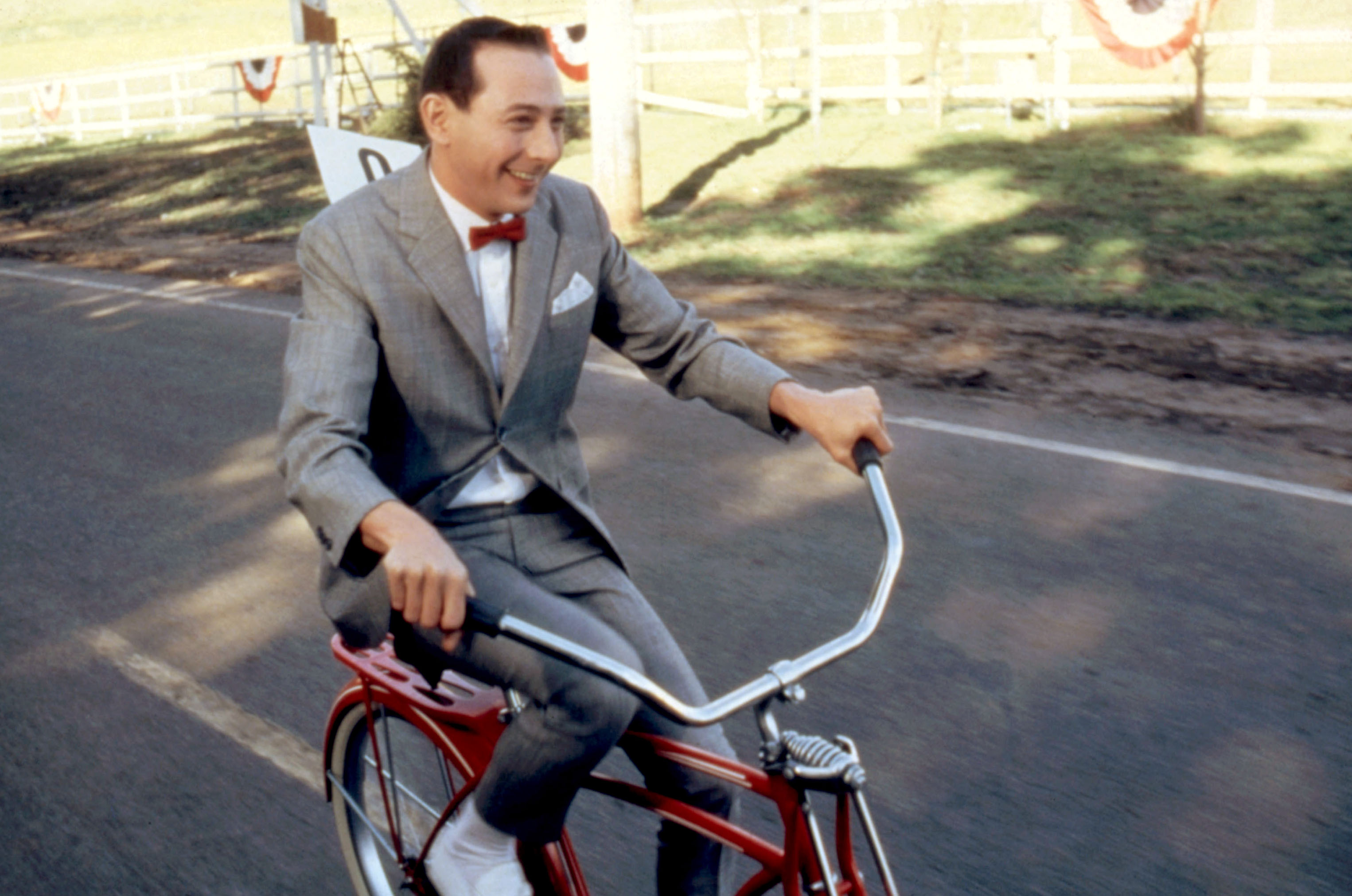
40 years later, “Pee-wee’s Big Adventure” remains a pop-culture touchstone and a movie that, much like the character at its core, has helped audiences across the world stay in touch with the carefree innocence of youth.
Elfman: I never actually met Paul until the opening of the movie. Then I began this lifelong association with him. Later in life, I started doing “The Nightmare Before Christmas Live,” and it was a great pleasure inviting Paul to sing the Lock, Shock, and Barrel song [“Kidnap The Sandy Claws”] every year. When I listen back to “Pee-wee,” it sounds so simple, but I realized that was as much as I could do at that time. It was the beginning of me wanting to increase my skills.
Chiodo: Years later, I got married to a California girl who told me she saw “Pee-wee’s Big Adventure” with her girlfriend Cynthia Garris, [director] Mick Garris’ wife. When she saw Large Marge, she told Cynthia, “I want to marry the guy who made that.” She told me that when I first met her, but I didn’t really believe her. I later asked Cynthia, and she said, “Oh yeah. She said, ‘I want to marry the kind of guy who makes things like this.’” That’s my wife, Teresa.
Daily: They would screen the movie at the Hollywood Forever Cemetery. There would be thousands of people picnicking in the cemetery; they knew all the lines and the characters… It made you think, “Wow, this is really iconic.”
Salinger: Fans come up to me and say, “I was going through a really bad time as a child, and I’d put this movie on all the time, and it saved me.” Some would say, “You were my rock during my childhood.” I’ve had amazing parts, but I have to say, “Pee-wee’s Big Adventure” is my heart.
Burton: It’s funny because when it first came out, it didn’t even play in Europe. It wasn’t released there, so it’s had a slow burn. I always feel very grateful if somebody connects with it. It’s really nice. You can feel it. It’s not just someone giving you a compliment. You can feel something. I’m always very happy to see that.
Daily: I know it’s made people really happy and brought a lot of fun and joy. This movie lets people tap back into that fun childhood stuff that everybody remembers and relives as an adult. It’s that element of fun that we all had as kids. We get to relive it through Pee-wee.
Holton: Years later, Paul talked me into doing conventions. It’s great seeing two or three generations of people showing up with their kids dressed like Pee-wee. I once had a father and son both dressed as Frances Buxton. I’ve only run into one of those so far.
Chiodo: The special effects we create are memorable because they’re unique and special — and Large Marge is one of them. When you think about Pee-wee’s Big Adventure, you think about Large Marge, and I’m so proud to be one of the people that created that. It’s iconic.
Elfman: Paul was instrumental in my life. I don’t know if Tim would’ve thought of coming to me just from my association with a rock band. I really feel that Paul is the one that lit the flame. If it wasn’t for him, I doubt whether I would’ve become a film composer. It was just one of those lucky breaks.
Burton: [It taught me to] keep the passion, fun, and newness of what you’re doing. There’s something to be said for that, where you do something because you’re into it, love it, and just kind of go for it. It was the first movie I made, and it being such a positive experience kind of sets you up for trying to feel that positivity as best you can whenever you’re making something. I always try to remember that feeling, the creative excitement, and the newness.


